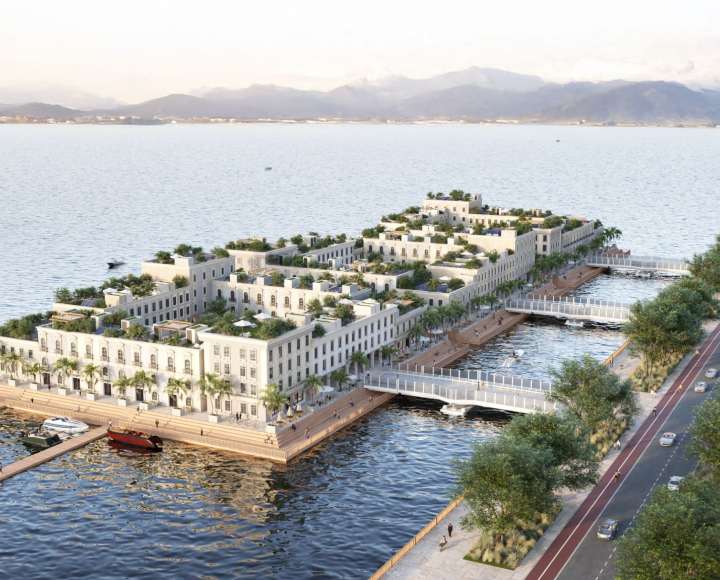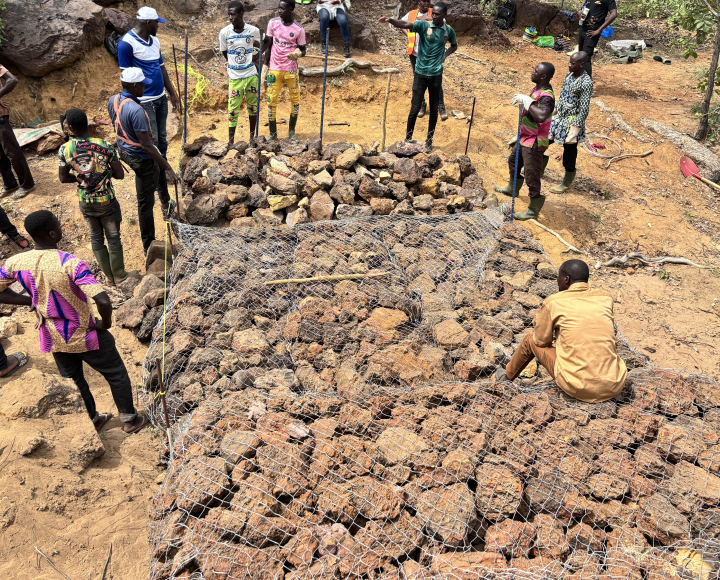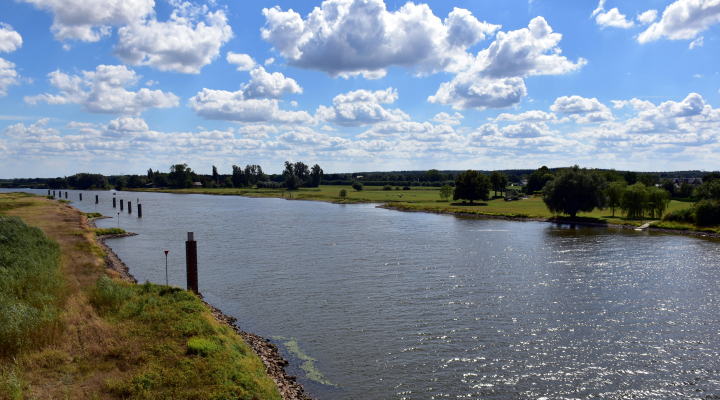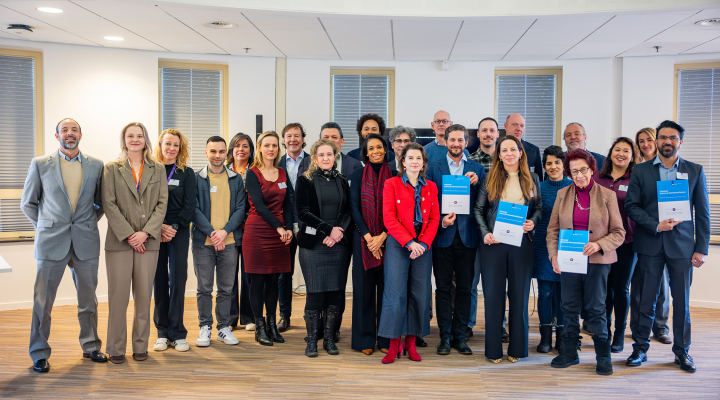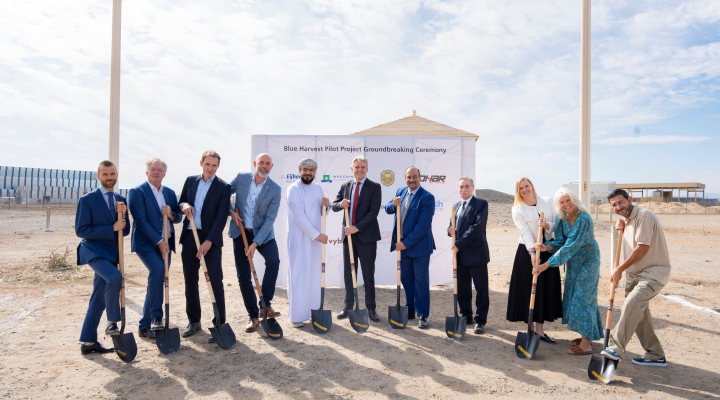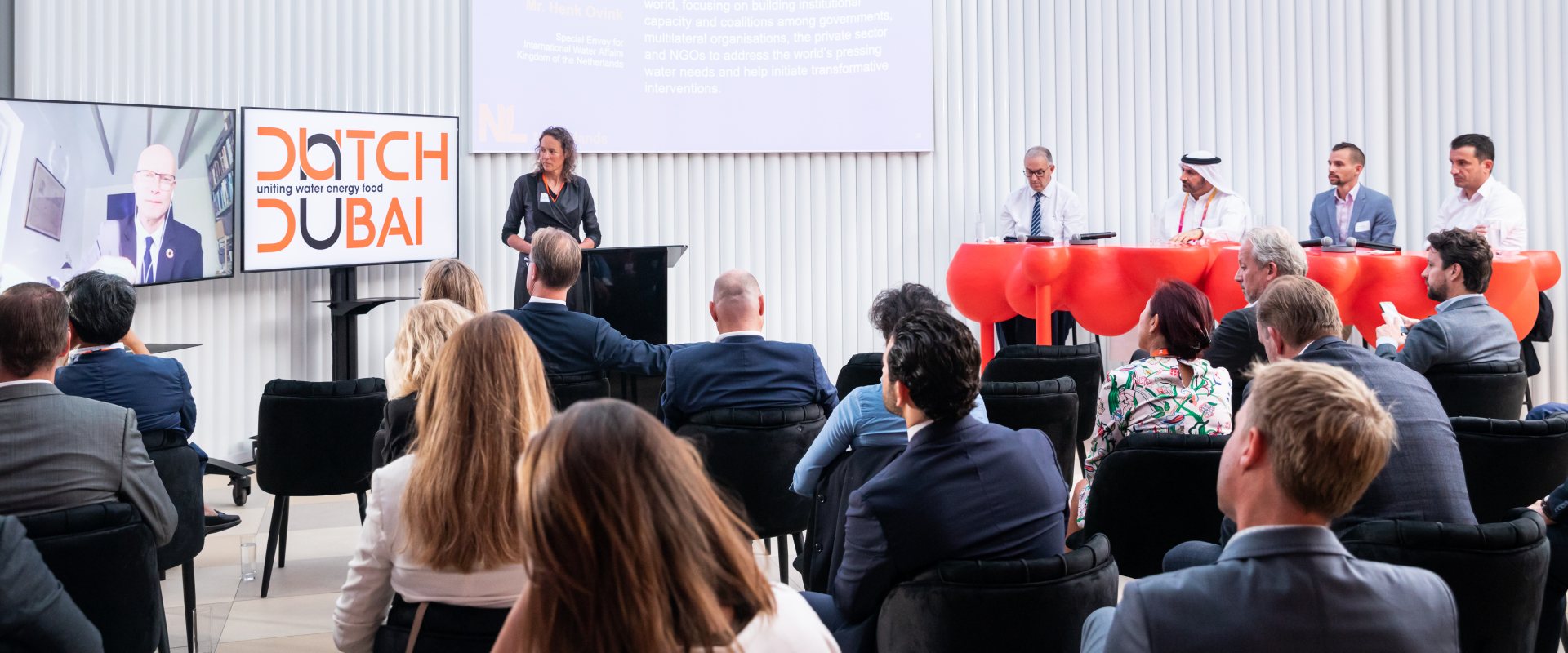
Cities and Water: Learning by Doing
Time is running out; beautiful words must be converted into tangible and visible deeds when it comes to climate adaptation. Cities play a crucial pioneering role in this process - not least because they are hit hardest by climate change worldwide. This awareness was central during the event 'Two Extremes: Flooding and Heatwaves. Resilience Challenges and Innovation in Cities' which took place on 1 November at the Netherlands Pavilion during the Rural and Urban Development Week in Dubai.
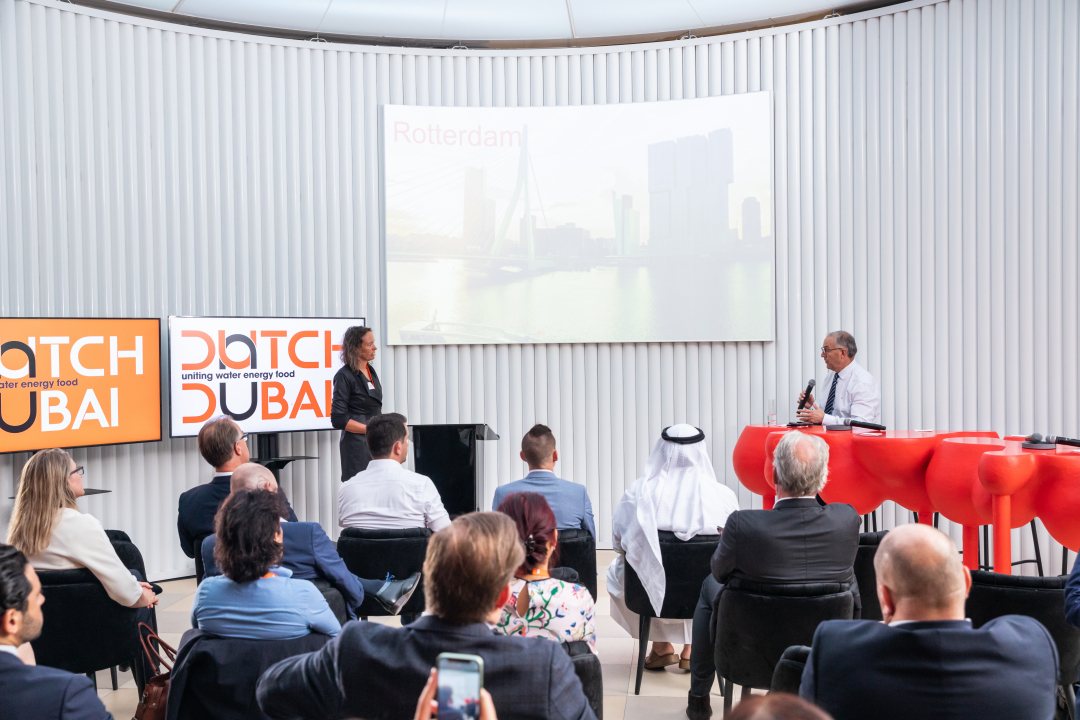

The high-level representatives from the cities of Christchurch, Dubai, Mexico City, Rotterdam, Santiago, the State of Maryland, and Tirana gave a clear message in Dubai. The session reflected what UN Secretary General António Guterres said two years ago: "Cities are where the climate battle will largely be won or lost, and mayors are the world's first responders to the climate emergency."
This special day, in which the Netherlands Pavilion highlighted the role of urban and rural development, was hosted by Bianca Nijhof, Managing Director of the Netherlands Water Partnership (NWP). The opening ceremony was kicked off by Peter Potman, Deputy Director General of External Economic Relations at the Government of the Netherlands. The day also featured different contributions from Henk Ovink, Special Envoy for International Water Affairs for the Kingdom of The Netherlands.
Rotterdam Mayor Ahmed Aboutaleb, the Expo Champion for Dutch Dubai who presided the closing ceremony of this special programme, summed it up succinctly: "The COP26 in Glasgow is the stage for political commitment. Our leaders are talking, but we have to act. Water equals spatial planning. And spatial planning is our responsibility. It is better to not wait for big decisions by national governments. I am happy to be here with people fixing things on the ground. Water is our enemy, but also our friend. Thanks to the river and the sea, we have our harbour, bringing wealth."
But too much or too little water is also a threat. "We have excellent dykes, but if they break, 80,000 people are in immediate danger. And drought causes an influx of salt water, so not long ago, the intake for producing drinking water was set on hold for 90 days. At the same time, we need to build an enormous number of houses. So, we have to rethink our water management."
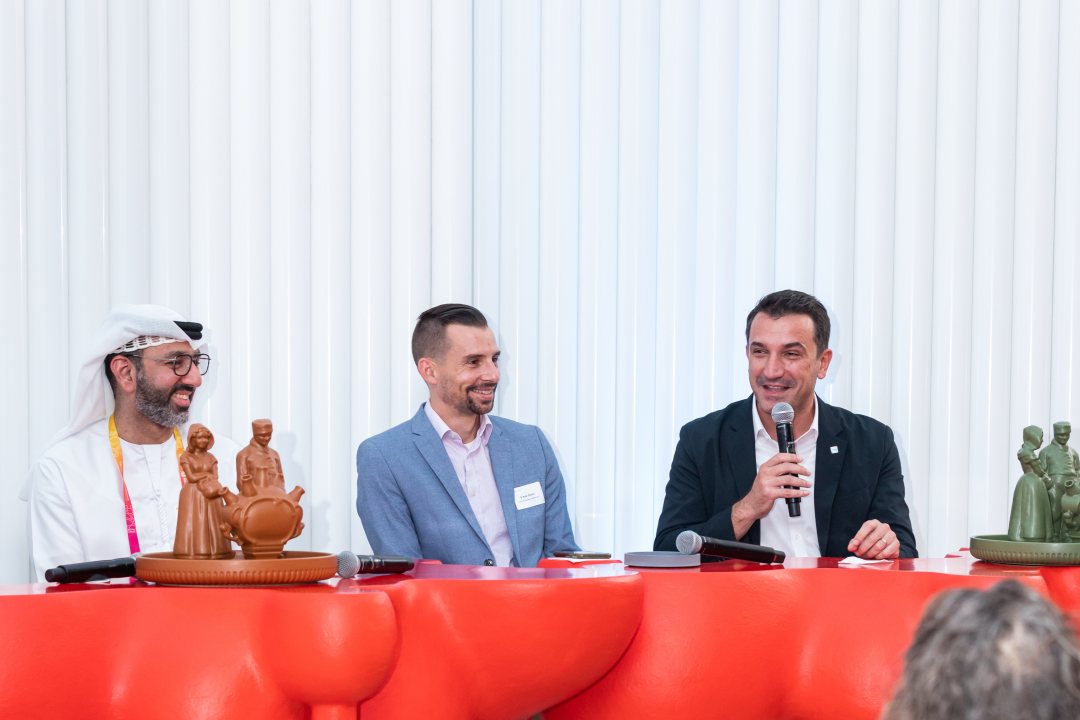

'He waka eke noa'
Mayor Lianne Dalziel of Christchurch, New Zealand drew attention to the need for a bottom-up approach with a strong role for local communities. "We need to transfer information in the right way, so that people really understand the risks. And the voices of children and young people need to be heard as well. This is how you come to plans that work." Leanne Dalziel ended with a famous Māori saying: 'He waka eke noa', which means 'we are all in the same canoe'.
That was also a key message from Kyle R. Overly, Maryland's Disaster Risk Reduction Director. He argued for more public-private solutions and for more cooperation. "Although we are very different, we are all facing the same challenges. That's why we need to partner, to figure out what the cities of tomorrow should look like. We are looking forward to learning more about the best practices from around the world."
Kyle Overly talked about the extreme flooding that has recently hit major cities in Maryland, with very large local differences. "We immediately took bold measures, but we also invested in green infrastructure with a sustainable impact. The best way to be successful is to engage local communities. And corporations are stakeholders as well; their workers live in the same cities."
Talib Abdulkareem Mohammed Julfar, CEO Infrastructure Services of the City of Dubai, and Adel Ali AlJasmi, Section Manager of the Sewerage & Drainage Systems Planning & Design of the City of Dubai, both pointed out how complicated it can be to invest in flood control measures, as floods can indeed occur in an area that is primarily known as hot and dry, and where the aging infrastructure is in need of renewal. They hope to learn a lot from a city like Rotterdam.
Claudio Orrego Larraín, Regional Governor regional Government of Metropolitan Santiago, Chile, described the huge climate change sensitivity of his country, where 70 percent of the water comes from melting glacier rivers and where there is a hard battle for water consumption, for instance between agriculture, cities, and copper mines. Legislation is an important instrument: no project goes ahead that does not meet the requirements on sustainability and water security.
Speed up and take adaptive action
Cities are at the heart of the problem - and of the solution as well. As Henk Ovink, Special Envoy for International Water Affairs for the Kingdom of The Netherlands, pointed out: "Cities produce more than 70 percent of global CO2 emissions and use two thirds of the world's energy. Hundreds of millions of people living in cities and especially in informal settlements are at risk. And more and more people are driven to cities. This migration can easily lead to regional conflicts and instability.
We need to speed up and take adaptive action. We have the knowledge, the technology and the resources. We need to create the political will to act, we have to accelerate our actions and we have to connect to private sector partners and knowledge institutes who continuously work on innovation. Water is the driving force of all nature, so let's use the power of water; leaving no one behind. The Dutch water sector invites you to team up, finding best solutions to change our world. Let's continue to work together for better lives in resilient cities. Let's not invent the wheel again, and share what we have learnt."
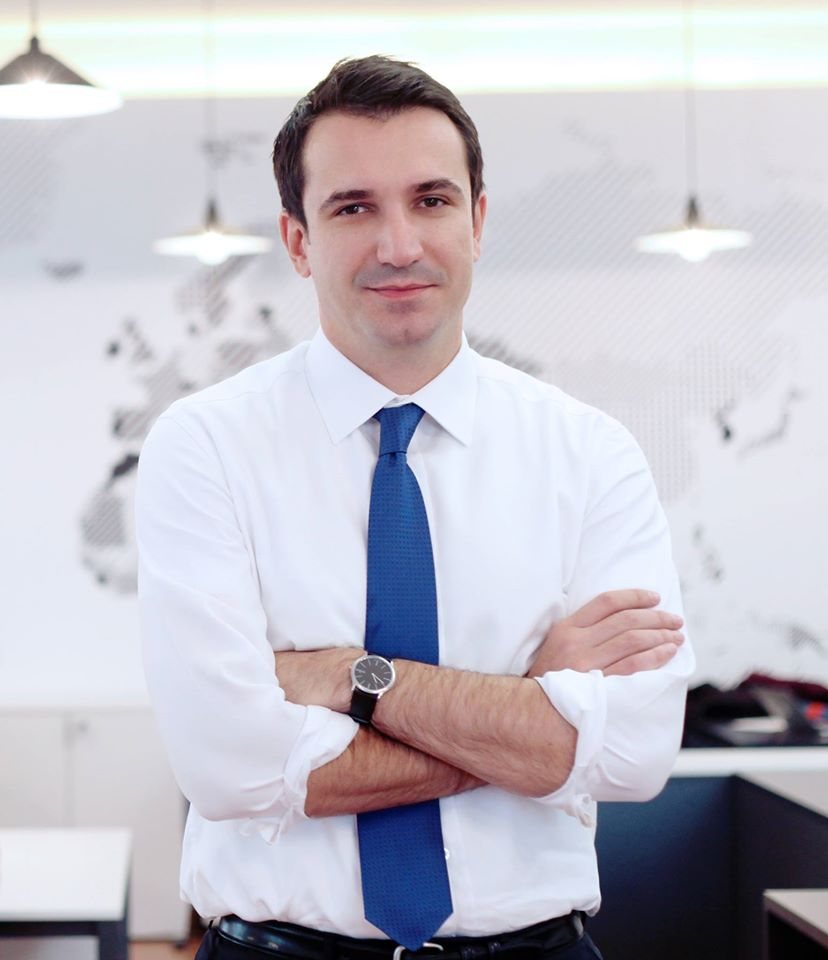

The rabbit and the lion
Erion Veliaj, Mayor of Tirana, Albania, has been at the heart of many challenges in the last five years: a drought that only occurs once every 100 years, as well as floods, snowfall, and a devastating earthquake - all unprecedented events for his region. "But challenges are opportunities as well; we focus on building back better. As mayors, we are the ones who have to deliver, we must plug the tires and plant the trees."
With an ironic reference to the world leaders converging in Glasgow, Erion Veliaj told the story about a rabbit who was at the bottom of the food chain and wanted to move up to keep himself alive. He asked the owl, who was supposed to be very wise. The owl advised the rabbit to become a lion. Top of the food chain, problem solved. Just one other question, said the rabbit, how am I going to do that? Sorry, answered the owl, we only do strategic thinking, not project implementation.
Determined to move ahead
To Bianca Nijhof, the message was clear: "Collaboration is key, no city can face the current and coming water challenges alone, especially if they are entwined with other major challenges. 26 percent of the Netherlands is below sea level and a great amount of our GDP is generated there. The Netherlands have been used to successfully living with water for centuries. We are looking forward to working with you, so stay in touch with the Dutch. And cities are at the frontline, they are sharing their experiences and solutions as they are determined to move ahead. Actions speak louder than words; cities are leading by doing.'
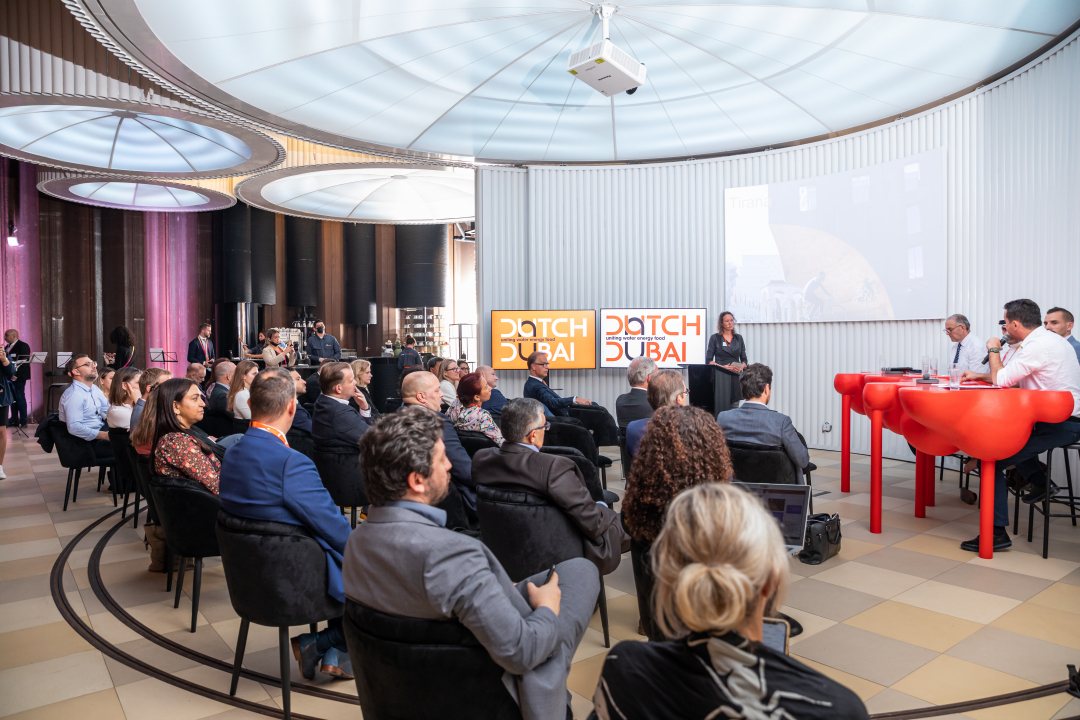

Technical sessions
There were several technical sessions during the day that covered the main themes of heat stress, flooding and coastal resilience. These sessions showcased multiple solutions that address resilience such as:
- cooling Kits for heat resilience
- plug-and-play desalination units using solar energy
- adaptation to heat stress through weather wise initiatives
- designing smart roofs to capture and evaporate rainwater
- drainage plans and integrated analysis of water management for flooding resilience
- sponge cities and floating development projects
- integrated inclusive approaches to restore flood safety and achieve resilient communities
- climate resilient PPP tool kit to aid decision makers in progressing partnerships for resiliency




